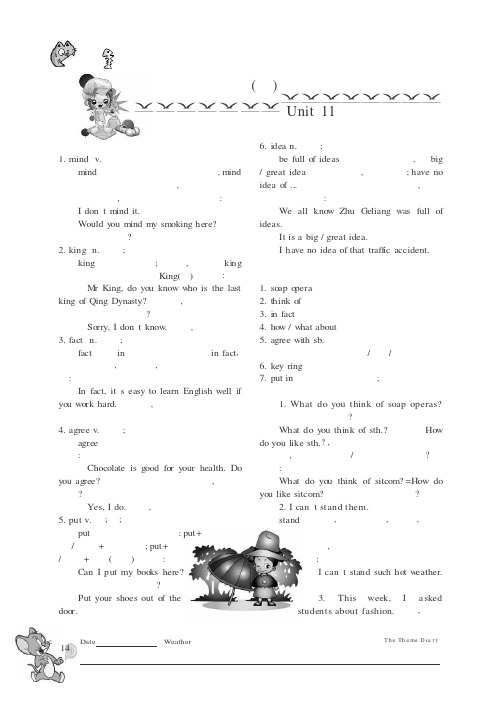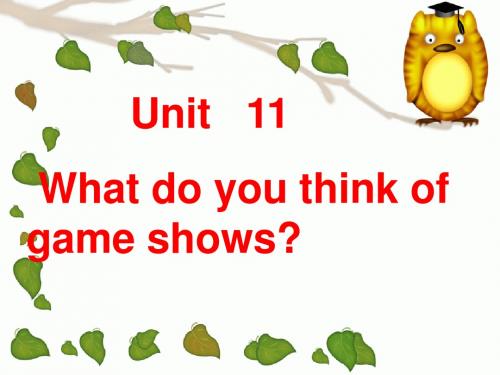新七下unit11知识点
- 格式:doc
- 大小:44.50 KB
- 文档页数:1

⼈教版(新⽬标)初中英语七年级下册Unit11预习⾃学f ire [ ' fa??( r)]n. ⽕; ⽕灾frie station [ ' ste??( ?) n] 消防站painting [ ' pe?nt??] n. 油画; 绘画exciting [ ?k' sa?t??] adj. 使⼈兴奋的; 令⼈激动的lovely [ ' l?vli] adj. 可爱的expensive [ ?k' spens?v] adj. 昂贵的cheap [ t?i?p] adj. 廉价的; 便宜的slow [ sl??] adj. 缓慢的; 迟缓的fast [ fɑ?st]adv.& adj. 快地( 的)robot [ ' r??b?t]n. 机器⼈guide [ ga?d] n. 导游; 向导gift [ g?ft] n. 礼物; 赠品all in all总的来说everything [ ' evr?θ??] pron. 所有事物; ⼀切interested [ ' ?ntr??st?d] adj. 感兴趣的be interested in…对……感兴趣dark [ dɑ?( r) k]adj. ⿊暗的; 昏暗的hear [ h??]v.( heard/ h?:( r) d) 听到; 听见Carol [ ' k?r?l] 卡罗尔( ⼥名)Unit11 知识梳理【重点短语】1 . school t r ip 学校旅⾏2 . go for a walk 去散步3 . milk a cow 挤⽜奶4.. r ide a horse 骑马5.. feed chickens 喂鸡6.. talk with a farmer 与农民交谈7.. take some photos 照相8.. ask some questions 问⼀些问题9.. grow apples 种苹果10.. show sb.around sp.带某⼈逛某地11.. learn a lot 学到许多12.. pick some strawberries 摘草莓13.. last week 上周14..In the countryside 在乡村15.. visit my grandparents 拜访我的祖⽗母16.. go f ishing 去钓鱼17.. sound good 听起来很好18.. climb the mountains 去爬⼭19 . play some games 玩⼀些游戏20 . visit a museum 参观博物馆21 .visit a f i re station 参观消防站22 . draw pictures 画画23 . go on a school t r ip 去旅⾏24 visit the science museum 参观科技博物馆25.. how to make a model robot 如何制作机器⼈模型26.. gift shop 礼品店27.. buy sth.for sb. = buy sb.sth. 为某⼈买某物28 .all in all 总得来说29 .be interested in...对… 感兴趣30 .be expensive 昂贵的31 .not. . . at all ⼀点⼉也不【重点句型】1 . --- Did you see any cows? 你见到奶⽜了吗--- Yes,I did.I saw quite a lot.我见到了⽽且见到了很多很多2.. --- Did Carol take any photos?罗尔拍照⽚了吗?--- Yes, she did. 是的,她拍了。

栏纳milk 挤奶牛奶feed 喂养;饲养grow .种植;生长;发育excellent 极好的;优秀的farm 农场.务农;种田countryside 乡村;农村worry &.担心;担忧luckily 幸运地;好运地museum .博物馆fire .火;火灾lovely 可爱的exciting 使人兴奋的expensive 昂贵的robot 机器人slow 缓慢的;迟缓的cheap .便宜的;廉价的gift .礼物;赠品fast &快的(地)guide .导游;向导hear 听到;听见go for a walk 去散步milk a cow 给奶牛挤奶ride a horse 骑马feed chickens 喂鸡talk with...与……交谈take photos 照相show sb.around...带领某人参观……in the countryside 在乡下go fishing 去钓鱼the school trip 学校旅游fire station 消防站be interested in...对……感兴趣1.It was so much fun.这真好玩。
2.The rooms were really dark and it was difficult to take photos,so I didn ’t take any.这些房间真黑,很难拍照,所以我没拍。
3.—How was your school trip?—It was great.———你的学校旅行怎么样?———很好。
4.—Did you go to the zoo?—No,I didn ’t.I went to the farm.———你去了动物园吗?———不,我没去。
我去了农场。
5.—Were the strawberries good?—Yes,they were.———草莓好吃吗?———好吃。
【重点词汇】【重难点句子】33Copyright ©博看网. All Rights Reserved.。

四川省资中县第二中学张家友Unit11知识要点归纳【重点单词点将台】1.mind v.介意mind常用于疑问句或否定句中,mind 后也可接动名词短语作宾语,但不能接动词不定式作宾语,也不能接双宾语。
例如:I don’t mind it.我不介意。
Would y ou mind my smoking here?你介意我在此抽烟吗?2.king n.君主;国王king常译为“君主;国王”,但是当king 大写首字母时就成了姓King(金)。
例如:—M r King,do yo u know w ho is the last king o f Qing Dynasty?金先生,你知道谁是清朝最后一个皇帝吗?—So rry,I don’t know.抱歉,我不知道。
3.fact n.事实;实际情况fact常与in连用构成介词短语in fact,意为“事实上,实际上”,一般用于句首。
例如:In fact,it’s easy to learn Eng lish well if yo u wo rk hard.实际上,如果你努力的话学好英语是很容易的。
4.agree v.同意;赞成agree常用来肯定别人的观点、建议等。
例如:—Chocolate is g ood fo r y our health.Do y ou ag ree?巧克力对你的身体有好处,你同意吗?—Yes,I do.是的,我同意。
5.put v.放;摆;装put常用的句型结构有:put+名词/代词+介词短语;put+名词/代词+副词(短语)。
例如:Can I put my boo ks here?我可以把书放在这儿吗?Put your shoes out o f thedoo r.把你的鞋放在门外。
6.idea n.主意;想法be full o f ideas意为“足智多谋”,而big /great idea意为“高见,好主意”;have no idea o f...意为“对……一点也不知道,完全不知道”。

【重点短语】1. school trip 学校旅行2. go for a walk 去散步3. milk a cow 挤牛奶4. ride a horse 骑马5. feed chickens 喂鸡6. talk with a farmer 与农民交谈7. take some photos 照相8. ask some questions 问一些问题9. grow apples 种苹果10. show sb. around sp. 带某人逛某地11. learn a lot 学到许多12. pick some strawberries 摘草莓13. last week 上周14.In the countryside 在乡村15. visit my grandparents 拜访我的祖父母16. go fishing 去钓鱼17. sound good 听起来很好18. climb the mountains 去爬山19. play some games 玩一些游戏20. visit a museum 参观博物馆21. visit a fire station 参观消防站22.draw pictures 画画23. go on a school trip 去旅行24 visit the science museum 参观科技博物馆25. how to make a model robot 如何制作机器人模型26. gift shop 礼品店27. buy sth. for sb. =buy sb. sth.为某人买某物28. all in all 总得来说29. be interested in... 对…感兴趣30. be expensive 昂贵的31. not...at all 一点儿也不【重点句型】1.---Did you see any cows? 你见到奶牛了吗---Yes, I did. I saw quite a lot. 我见到了而且见到了很多很多2. ---Did Carol take any photos? 罗尔拍照片了吗?---Yes, she did.是的,她拍了。

七年级下册英语11单元笔记
以下是七年级下册英语11单元的笔记,供您参考:
1. 重点单词:
prepare 准备
exam 考试
grade 成绩
fear 害怕
half 一半
size 尺寸
time 时间
2. 重点词组:
be ready for 为……做好准备
how about ……怎么样
have a good time 过得开心
be sure to 一定要
3. 重点语法:
现在进行时表示将来的动作,如:I am leaving for Beijing tomorrow。
表示预计、预见的动词,如:expect、fancy、fancy、foresee等。
4. 重点句型:
I am leaving for Beijing tomorrow。
我明天要去北京。
How about going to the park?去公园怎么样?
5. 重点话题:
谈论未来计划和安排,如旅游计划、考试准备等。
6. 重点写作:
用现在进行时写一封信,告诉朋友你即将去旅行或参加某个活动,并询问对方的计划和安排。
7. 重点阅读:
阅读一篇关于旅行的文章,了解旅行前的准备和注意事项。

Unit11 How was your school trip 要点详解How was your school trip? 重点词汇1. beat, win(1)beat指在比赛或战斗中打败某人。
意为“蠃”,此时,其宾语只能是表示人或团队的词语,不能用表示比赛、奖品等内容的词语作其宾语。
beat的反义词为lose. lose to sb. 输给某人。
(2)win表示“赢”,其宾语是表示比赛、奖品等内容的词语,不能用表示人的词语作其宾语。
win还可以作不及物动词用,后面不接宾语,表示“获胜”。
其反义词也为lose. lose sth.. 输了某事(物)。
如:He won the tennis match. 他赢得了那场网球比赛。
We are sure that we can beat them. 我们相信能战胜他们。
2. gift 礼物(1) gift用作名词,表示“礼品,礼物”时,与present同义。
Thank you for your beautiful gift. 谢谢你送给我的漂亮礼物。
(2) gift用作名词,表示“天赋,天资,才能”时,常构成短语have a gift for意为“有某方面的天赋。
如:She has a gift for music. 她有音乐天赋。
(3) gifted用作形容词,意为“有天才的,有才华的”。
如:He is a very gift person. 他是一个很有才华的人。
3. visitor 访问者,参观者,游客Millions of visitors visit the Great Wall every year.每年有数百万游客游览长城。
visitor是由“动词visit+or”构成的名词,类似的词还有actor, inventor, translator等。
思维拓展:“动词+er”构成名词,如:worker, teacher, singer等。
The teacher teaches us very well. 这位老师教我们教得非常好。
2020年人教版新目标七下Unit 11 How was your school trip ?单词与课本要点解释Section Ak v. 挤奶 cow n. 奶牛milk 此处作及物动词,意为“给……挤奶”;还可作不及物动词,意为“挤奶,出奶”。
cow可数名词,意为“母牛,(尤指)奶牛”。
milk a cow 给奶牛挤奶I helped my father to milk the cow. 我帮助我父亲给奶牛挤奶。
This cow milks very well.这头奶牛出奶很好。
His aunt has two cows on the farm. 他姑姑在农场有两头奶牛。
【拓展】milk还可用作不可数名词,意为“牛奶”。
Would you like some milk? 你想喝些牛奶吗?2.horse n. 马 ride a horse 骑马3.feed (fed) v. 喂养;饲养feed chickens 喂鸡fed 为 feed 的过去式。
feed 此处作及物动词,意为“喂养;饲养”,其后常接表示动物名称的词作宾语。
I feed my dog every day. 我每天都喂我的狗。
My father's job is to feed animals. 我父亲的工作是喂养动物。
【拓展】feed的常见用法有:①feed sth.to sb. /sth. 把某物喂给某人/某物Please feed some grass to the cow. 请给这头奶牛喂些草。
She fed milk to the baby. 她给婴儿喂了牛奶。
②feed on 以……为生,以……为食Sheep feed on grass. 绵羊以草为食。
③feed…on/with…用……喂……He feeds the dog on meat. 他用肉喂狗。
4.farmer n. 农民;农场主farm名词,意为“农场”;动词意为“耕种;干农活”。
Unit 11 How was your school trip?1.短语归纳2.典句必背3.用法集萃(1)I saw quite a lot. 我看到了很多。
❖quite a lot表示“许多”,若表示“许多....(人或物)”要用quite a lot of... 的搭配。
例:I ate quite a lot last night. And I didn't feel well. 昨天晚上我吃了许多。
我觉得不舒服。
We saw quite a lot of sheep in the village. 我们在那个村庄里看到了许多绵羊。
(2)But I milked a cow. 但是我给一头奶牛挤奶。
❖milk 作名词,意为“牛奶”,是不可数名词。
例:I’d like a cup of milk. 我想要杯牛奶。
❖milk 作动词,意为“挤奶”。
例:I helped the farmer (to) milk the cow. 我帮助农民挤奶。
(3)Carol picked some strawberries and took them home.卡萝尔摘了一些草莓并且把它们带回了家。
❖pick用作动词,有“采;摘”之意。
此时是及物动词,宾语通常是花或果实等。
例:She went to the garden and picked some strawberries. 她去花园摘了一-些草莓。
❖拓展pick up是固定搭配,意为“捡起;拾起”,它的宾语有两种形式:(4)And I fed the chickens with my grandpa. 我还和我爷爷起喂鸡了。
❖feed作动词,意为“喂养;饲养”,它的过去式是fed。
例:Yesterday I went to the farm and fed chickens there. 昨天我去了农场并且在那里喂鸡了。
(5)But at about two o’clock, it got very cloudy and we worried it would rain.但是在大约两点时,天气变得多云了,我们担心会下雨。
春季学期七年级英语下册各单元知识点大归纳
Unit 11 How was your school trip?
◆短语归纳
1. go for a walk 去散步
2. milk a cow 挤牛奶
3. ride a horse 骑马
4. feed chickens 喂小鸡
5. talk with 与……谈话
6. take photos 拍照
7. quite a lot 相当多8. show… around 带领……参观9. learn about 了解10. from… to… 从……到……11. grow strawberries 种植草莓12. pick strawberries 采草莓13. in the countryside 在乡下14. go fishing 去钓鱼
15. at night 在夜晚16. a lot of 许多;大量
17. come out 出来18. go on a school trip 去学校郊游19. along the way 沿线20. after that 之后
21. buy sth. for sb. 为某人买某物22. all in all 总的来说
23. take a / the train 乘火车24. be interested in 对……感兴趣25. not… at all根本不……
【用法集萃】
2. too many + 可数名词复数太多的……
3. teach sb. how to do sth. 教某人怎样做某事
◆语法点拨
重点句子:
1.Did you see any cows?你看见奶牛了吗?
Yes,I did. I saw quite a lot.是的,我看见了许多。
quite + a / an + 形容词+可数名词单数
= a + very + 形容词+ 可数名词单数一个相当/ 很……
2. Did you ride a horse?你骑马了吗?
No, I didn’t. But I milked a cow.不,我没有,但我挤牛奶了。
did的各种句式:
⑴.肯定句:主语+动词过去式+
其他。
⑵否定句:主语+didn’t+动词原形+其他。
⑶一般疑问句:Did+主语+动词原形+其他?
肯定答语:Yes, 主语+did. 否定答语:No, 主语+didn’t.
如:
—Did you ride a horse?
—Yes, I did.
(肯定回答)
—No, I didn’t.
(否定回答)
⑷特殊疑问句:疑问词+did+主语+动词原形+
其他?3.How was your school trip?你的学校旅游怎么样?
How + be…? + like? ……怎么样?
4.What did Tina do? 蒂娜干什么了?
She picked some strawberries.她摘了一些草莓。
pick strawberries 采草莓
5.I visited my grandparents in the countryside.我看望了我在农村的祖父母。
in the countryside 在乡下
6.I went fishing every day.我每天钓鱼。
go fishing 去钓鱼
7.The farmer showed Tina around the farm.农场主带领特纳参观了农场。
8.It got very cloudy and we worried it would rain.天阴得很厉害,我们担心将要下雨。
9. Then the guide taught us how to make a model robot.
然后,导游叫我们怎样制作机器人模型。
10.All in all, it was an exciting day.总之,这是令人激动的一天。
all in all 总的来说
11.Everything was about robots and I’m not interested in that.
一切事情都是关于机器人的,我对那不感兴趣。
be interested in 对……感兴趣
12. The rooms were really dark and it was difficult to take photos.
房间真的很暗,拍照很困难。